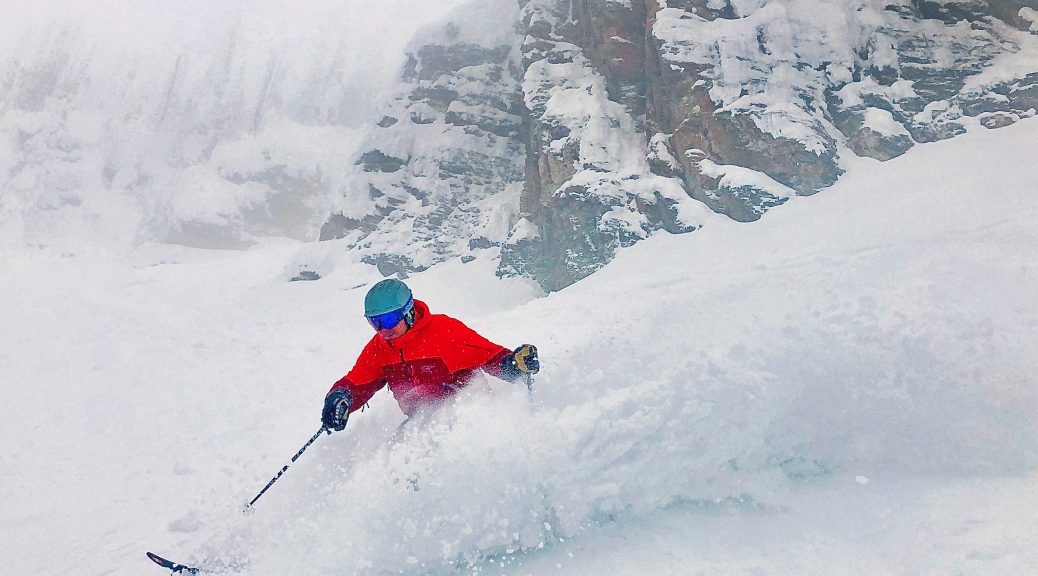July 07, 2022
Drew discusses his NFL career, his focus on family, and returning to his hometown.
Interview by Brian Schott, Mike Powers & Ryan Friel
The first issue of Whitefish Review published in 2007 contained an interview called “Drew Bledsoe and the Art of Football.” Why talk to an NFL star in a literary journal? Because creative minds are the essence of all art. And art can be found in the strangest of places. On January 11, 2022, Whitefish Review founding editors circled back and once again sat down with Drew for an interview. This time they took a series of chairlift rides with the tape recorder running, skiing powder during a winter storm at Whitefish Mountain Resort.
Drew played in four Pro Bowls, is in the Patriots Hall of Fame, and was in the top 10 overall for a number of QB statistics upon his retirement. After his 14-year career in the NFL in 2007, Drew selected his hometown in Walla Walla, Washington to plant his original estate vineyard, McQueen, on the southern end of the Walla Walla Valley. In 2008, Drew and his wife, Maura, launched Doubleback as an estate-focused winery with the goal to produce world-class Cabernet Sauvignon—the winery’s name a reference to his return back home. His very first vintage was named a Wine Spectator Top 100 Wine of the World. To make his dream a reality, Drew hired winemaking guru Josh McDaniels as his CEO & Director of Winemaking. Since then, Drew has also founded Bledsoe Family Winery and co-founded Bledsoe|McDaniels as a collaboration with Josh. Drew and Maura have four children and reside in Bend, Oregon while also spending plenty of time in Whitefish, Montana.
The interview sessions are blended and edited for clarity.
Brian Schott: Since we have six minutes on this ride, let’s talk chairlift rides first. Circle back to 2002. You’re back from the Super Bowl. This chairlift ride. Bring us back to that moment.
Drew Bledsoe: Actually, first let’s go back a little farther. Let’s go back to 1996. I came up here, for the first time skiing this mountain. First lift ride ever on this chair, freezing cold. One of those days up here when most people are not dumb enough to come out and ski. So, I happen to be seated next to these two guys. [Drew points to Ryan Friel and Mike Powers and laughs.]
I don’t know which one of them said, “Your voice sounds familiar. Where are you from?” “Well, I’m from Washington, but living back in Boston.” One of them shouts, “You’re Drew Bledsoe!?” [more laughter] And I said, “Yeah. Let’s go ski!” And you proceeded to show me around the mountain. The next thing you know, we bought a house in Whitefish and have been coming up here for the last 26 winters.
Brian Schott: Thanks for setting the stage.
Drew Bledsoe: So we had won the Super Bowl in 2001, but I had gotten hurt.
[Drew nearly died after being hit by a clean, but brutal tackle, suffering a hemothorax. He tore one of the blood vessels behind his rib that slowly leaked three liters of blood into his chest cavity. After the injury, Tom Brady replaced him as the starting quarterback.]
That year was awesome for the team, but a little painful on a personal level. But I made it through. I kind of kept everything in check all through the season. Then the day we won the Super Bowl, I had a plane waiting for us and we flew here that night. The next morning, I got on this chair and was riding up here by myself. I had jumped on and was the only one on the chair. Everyone else was hungover from their Super Bowl party.
I got about halfway up here and tears started to flow. That’s when I kind of let it all fly. It was cathartic. By the time I got off the chair, I was ready to rip and put it behind me. I finally was able to just let everything go. Because when you are in that position I was in, you’ve got to be strong for the team, be strong for your family, be strong for everyone. But then when I finally got up here, I could just let it go.
Brian Schott: Was that a bit lonely? It seems that you purposely kept some of those emotions and any potential hard feelings to yourself because you thought more of the team.
Drew Bledsoe: Of being a good teammate and all that stuff. But I wasn’t lonely. I never felt that. I had great friends on the team and great support at home. I think all my friends understood I was doing the right thing, but it wasn’t easy. But I was never lonely. But that morning I rode up this chair, that was lonely on purpose. I needed that time by myself for a little while. Then I was reset and ready to rock and roll.
Brian Schott: So, I guess that cycles into our theme for this issue, The Vortex. We’ve been experiencing this whirlwind and looking for a calm center. I relate that to your mentality as a quarterback where you have talked about being in a bees nest and there is still a center of calm. Can you talk about that place?
Drew Bledsoe: When you are on the football field, especially when you’re young, especially your rookie year, the best allusion I ever heard was, “It’s kind of like you stick your head in the popcorn machine and popcorn is just exploding everywhere and you’re trying to focus with things exploding in your face.” There are so many direct correlations between playing ball and life, but when you’re playing ball, you’ve got to be able to put that stuff aside and focus on the part that is in your control. I have to go do my job and try to execute this piece of it as well as I can, in spite of what else is going on. That’s what we are dealing with right now.
Mike Powers: That’s life right now.
Drew Bledsoe: Yeah, the whole world seems crazy right now but when you boil it down, what part of it is mine? What part can I handle? Try to handle your part as well as you can.
Brian Schott: How does skiing play into your life?
Drew Bledsoe: I started skiing when I was two years old. Even when I was playing football, I was up here with all of you guys. Skiing has always been important to me. With all the restrictions in the rest of our lives the last couple of years, having that familiar freedom of standing on a pair of skis and going wherever you want to go feels pretty good.
Brian Schott: Can you talk a little bit about being empty nesters? It’s a whirlwind having kids, but what is it like when your kids move on?
Drew Bledsoe: My wife decided she didn’t like the term “empty nester” because she thought it sounded sad. So we decided we’re “free birds.”
Ryan Friel: Much better.
Drew Bledsoe: Much better right? It’s a big change. You’re raising kids and they are the center of your universe and now suddenly you have free time to do whatever you want. Especially with the business we are in, I am not tied to a particular schedule very often. So, it’s an interesting transition for us to do some traveling and spend some time in other places and not be constrained by kids in sports and school. It’s been a lot of fun so far.
We’re going to spend more time in Walla Walla, spend more time here in Whitefish. And then, who knows? One of the things that happened with us with everything changing on a daily basis—when you don’t know what the next day brings—is that we’ve gotten pretty good at rolling with the punches. “Well, alright that happened I guess we can’t do that, then let’s do this.” Like Mike Powers was saying, his trip to New York City to see some live music got canceled, so he just skied for five days in a row. You just learn to roll with the punches.
Ryan Friel: Pretty good backup options.
Drew Bledsoe: Exactly. And we’re so blessed to live where we live—that there are a lot of backup options.
Ryan Friel: It’s funny for me to hear you say that because when people from here are all doom and gloom about the global pandemic, I say, “Let’s look at it this way: we’re already where everyone wanted to get to.” I chose to be here, so where do I want to go during a pandemic? Right here.
Brian Schott: Can you talk a bit more about living with uncertainty?
Drew Bledsoe: It’s been funny. Life and sports are tied together in a lot of ways. And business and sports are tied together in a lot of ways. One of the things in leading a football team as a quarterback is that there is something unexpected that is going to happen in every game, every single week. You’ve got to learn to adapt and overcome and persevere. For me, living with uncertainty is something I am pretty comfortable with. I figure I am more valuable and bring more to the world when things are chaotic. Because I am able to be calm when things are in chaos. Some people go the other way. When it’s chaotic, they just can’t think and that’s actually when I get really calm.
Ryan Friel: That’s great. We need more “you’s” around us.
Drew Bledsoe: Just shift gears, change your tack, and just go. Don’t sit still and cry about the way things were supposed to be. Well, things aren’t that way, so let’s do something else.
Ryan Friel: When we spoke with Yvon Chouinard about the future of the earth, he said something like, “Well polar bears are great, but the reality is they are kind of already gone. We are too far past that.” So, he spends his time and effort on where he can really make an impact.
Drew Bledsoe: I think when you boil it down to a personal level, we all have plenty of things we can do in our own lives that can make a difference.
Brian Schott: When we were just skiing, you were mentioning it was a big year of transition.
Drew Bledsoe: It’s been crazy. We had two college graduations and a high school graduation, and so we became free birds. Our dog Isabel passed away, my mother-in-law passed away, and we sold two houses. It boils down to me and my wife. And thankfully she likes me most of the time. We have a lot of great friends we get to spend time with, so in a lot of ways, life has gotten a lot simpler during this chaotic time. Partly as an answer to the chaos and partly because that’s the stage of life we have gotten into, we’ve just simplified things and it’s pretty relaxing when it gets simpler. Try to ski more. Travel more.
We’ve been traveling a ton. South of France. We made a trip to Spain to go see our son Henry who was studying abroad over there. Took my folks with us—convinced them to go to Europe for the first time in their lives, which was awesome. One trip down to Mexico, down to Punta Mita, and then up here in the fall more, which was fun. We took a boat out in the San Juan Islands up into British Columbia with some friends who were also empty nesters at the same time. We chartered a boat and went cruising through the islands. It’s been fun. We’ve been enjoying ourselves.
Mike Powers: Let’s talk about your hometown Walla Walla if we could. What does working with the land to make your family wine mean to you?
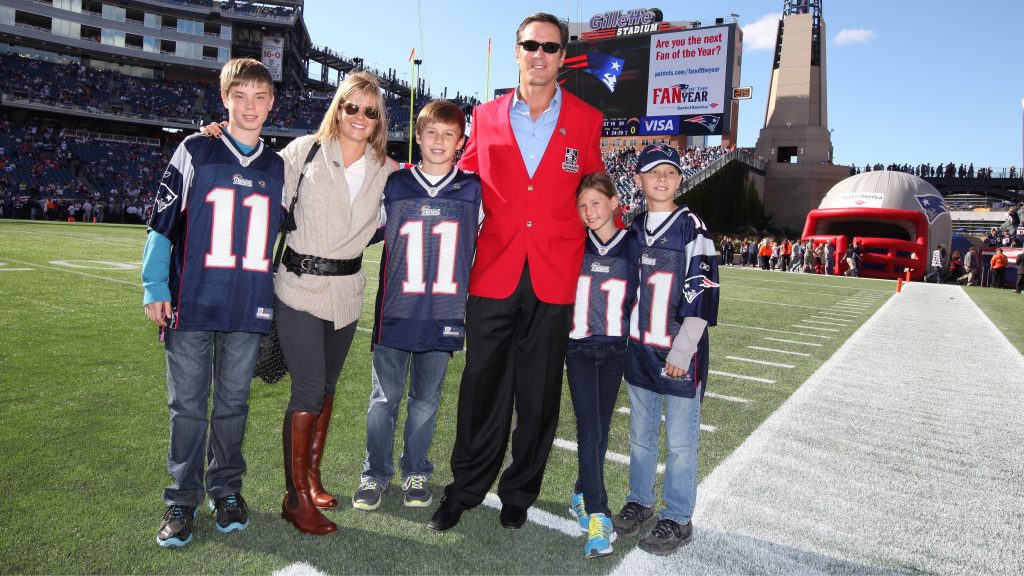
With wife Maura, Stu (14), John (13), Henry (11), and Healy (9). (courtesy Drew Bledsoe)
Drew Bledsoe: It has been really rewarding for us because we have built a business that is founded on two things. We’ve got great land and great people. As far as the land, we are very good stewards. We believe in creating a natural environment around the vineyard. It is not a monoculture of just growing grapes. We are growing grapes, but around that, we have all kinds of beneficial plantings. We try to stay hands-off as much as we can. By creating that environment, we can use less chemicals. We use no pesticides. We use very little, almost no herbicides because that natural environment becomes as nature intended. A natural environment that doesn’t need more input. You combine that with the people we are working with… and we should talk about that on our next lift ride.
[Ride on the East Rim Chair up over the big cliff.]
Drew Bledsoe: Right up here is one of the few times I got into real trouble with my wife and daughter. I said, “Hey, just follow me.” Well, I ended up going over there [Drew points to a place with sheer cliff drops.] and getting cliffed out with my wife and daughter. We all had to take our skis off and hike up. [laughter] That was a quiet car ride home with the two of them. They were not very happy with me.
Mike Powers: We were talking about the people you work with.
Drew Bledsoe: In addition to creating a natural environment and ecosystem, we started our own farm company three years ago. We have a 12-person crew now. Most farm labor—and vineyards are no exception—is seasonal labor, with many laborers coming from Mexico. By starting this farm crew, for the first time in their lives, they have full-time employment. We pay them well, and they have retirement benefits and health benefits for the first time in their families’ lives. We feel like it’s the right thing to do, to take care of your people. And Josh McDaniels and I both want our moms to be proud of us, so we try to do the right thing.
The cool thing with both of those endeavors is that by taking care of the land, creating that environment, and taking care of our people, we produce a better product. The farm crew that works for us now treats the vineyard like it’s their own. They have this emotional attachment to what they do and it shows up in the fruit. It shows up in the bottle and we are able to produce a better product by doing the right thing. That has been one of the most gratifying things in our business over the past couple of years. Learning that doing right will also produce a better product and create a better business.
Brian Schott: There’s something to be said about a certain energy that you put into what you care for—you maybe can’t even put words to it—but can you talk about that unexplainable energy?
Drew Bledsoe: There is a lot of heart and soul and passion that goes into what we do. Whether it’s real or not—and I tend to think it’s real—I think you can taste it. I really think you can taste it. That passion is real with our team.
Whatever it is you are doing, if there is a real passion behind it, people can sense that and understand it. And the opposite is also true. If you’re bullshitting your way through something, I think people eventually figure that out.
It’s been really gratifying to watch Josh McDaniels, our CEO and Winemaker, over the past three or four years, teaching himself how to be a leader and a delegator. He has become a fantastic leader. You hear two things out in the business world. You can’t find employees and supply chain problems. The supply chain issues we haven’t been able to avoid. But on the people side, we have not lost a single employee in the past three years, and we have actually attracted more people to our business. One more example of where you do right, and you can be more effective at what you are trying to do.
Mike Powers: That’s a credit to the systems you and Josh put in place and hard work.
Drew Bledsoe: And hard work, exactly. And honestly a lot of study. Not getting complacent. I had to learn how to be a leader when I was 14 and figure that out. But Josh had been the guy who was always doing the work, not leading a team. He has now become a guy people would die for, they love working for him.
Brian Schott: Can you expand on leadership and teambuilding a bit more?
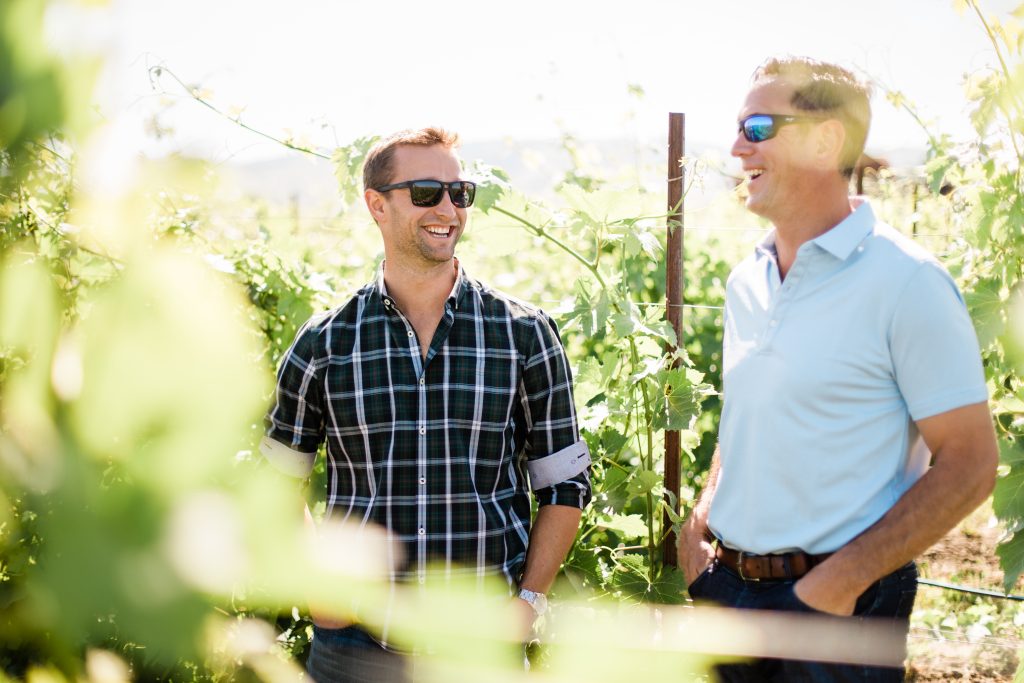
Drew Bledsoe: There are a few things we know to be absolutes. Number one, people need to know that they are valued, that they matter, and that their opinion counts. We’re good listeners. A lot of our best ideas have come from the bottom up and not the top down. Another absolute is that people want to be proud of the company they work for. People are proud to work at Doubleback.
One of our core values is health. We bought a gym membership for the company and encourage people that both their physical and mental health need to be taken care of. Going through all that we have been through the last couple of years, we made it very clear to everybody that look—this stuff is hard in all kinds of different ways—so if you need some time away or help with anything emotional or physical, the answer is one-hundred-percent “yes.”
Over the past couple of years, we sat down and identified our core values. The entire leadership team—of which there are nine including Maura and me—all participated. And so, we all got to define what the values in our company are. We didn’t define them and tell them what we thought was important. In building that culture, we wanted our team invested so they would live up to them.
You put all those things together and it becomes a place where hopefully people will want to stay for a long time. One of our big missions is to continue to build a company that no one wants to leave. Sometimes in a business like ours, like many businesses, you can get into a cycle where you’re training great employees so they can go get a better job with somebody else. We’re trying to train great employees and give them room to grow, so we don’t have to go rehire and retrain and so far, it’s been good.
Brian Schott: Flowing into that, talk about the importance of family.
Drew Bledsoe: First of all, it turns out that wine brings babies because it seems like everyone in our company is having kids right now.
Mike Powers: Direct correlation?
Drew Bledsoe: Yes, it’s a direct correlation, wine equals babies. [laughter] Our kids are part owners in the business now. The team knows our kids and they know Maura and they understand from us that family is a top priority in our lives. I think because of that they understand we want them to value their own families. And then they become part of our family. There are people who have been with us for a long time who do feel like family members. That is really gratifying. Ultimately, Josh and I have to be the boss, and sometimes that requires hard conversations. But at the end of the day, they know we actually care about them. All the way to the people who just started for us. I think that resonates with them and is easier to keep them going.
Our kids are not directly involved in the business yet. Stu got his degree in Wine Business, and we were thinking that he would come back, but he is working for an internet startup that is going well. We’ll see if they want to have any direct involvement or if they want to be in a board of directors’ role with it.
I got good advice from one of my mentors. He said you don’t build a business for your kids. You just build the best business you can, and they get to choose if they want to work for you or not. He’s an older guy that had been around a lot of different businesses and said if you build something and eventually force your kids into your business and don’t allow them to choose, you can create some pretty unhappy situations. Obviously, I would love it if they wanted to come back and get involved, but that’s their call.
I think so far, the two older boys want to go plant their own flag in the world. And we encourage that. They know they are always welcome to come back and go to work for us if they want to. They have a desire to be their own people for a while and then we’ll see if they want to come back and have some role with us. So far, they are doing well. Healthy and happy.
Mike Powers: I feel like in the last couple of years, in the age of the pandemic, there has been a lot of focus on negativity and obstacles. Let’s focus on how good that skiing felt right there.
Drew Bledsoe: That was pretty fantastic, some great skiing.
Mike Powers: Incredible. Skiing and being outside really helped me keep my sanity over the last couple of years.
Drew Bledsoe: I do have my favorite phrase of the whole shutdown. “Collateral benefit.”
Ryan Friel: “Collateral benefit.” Great term, I like it.
Drew Bledsoe: There were a lot of them honestly. If you look around. As I said, we are empty nesters, but suddenly we got to have all four of our kids at home for an extended period of time. We thought that ship had sailed and that we would never have them all together for more than three or four days at a time. We got out and took them all to Costa Rica and had a true family vacation with just the six of us. Who knows if that will ever happen again? We embraced the heck out of that.
Mike Powers: And to embrace it while you are in the moment. A lot of times you are looking back in the rear-view mirror at those family memories saying they meant a lot, but to get another chance at it is special.
Drew Bledsoe: On the business front, we had to cancel all our wine events—of which there were over a hundred— but we started doing virtual wine tastings. It turns out they were awesome because you can do three in a row from your living room and don’t have to get on an airplane. We had already started the process but continued redefining our company culture and what we stand for. All of a sudden we actually had some time to have all hands on deck to sit around and talk about what our company values are and what matters to us and what we want to be when we grow up. All that stuff. If you just got out of the news cycle and lived your life, there were a lot of things that turned into positives. But you had to approach it that way. I specifically do not read any news. I get my news second and third hand. I figure if it is important enough, someone is going to tell me.
Mike Powers: At Whitefish Review we love the creative process. Can you speak to the artistic process of the grape growing business?
Drew Bledsoe: The creative process when it comes to producing wine is a really cool combination of science and art. You have to do the science part. You have to know your sugar levels, to know your pH, to know your acid levels. You have to know all those things. But at the end of the day, it’s got to taste good.
There are some people that I have a lot of respect for in the wine industry who rely too heavily on the science and at the end of the day, you’re like, well okay, this tastes like a science project. It doesn’t taste like art. Wine is ever-changing and has so many variables. When you put together all these different plots from different vineyards and different barrels, different aging techniques, and all these variables, at the end of the day, we are trying to create a Bob Ross palette of wine flavors. We’ll take those, and we’ll take a little bit of this one, and a little bit of that one, and a pretty little bird here, and here’s a happy tree. You try to create a palette and put together something that ultimately is pleasing to people. That is what we are trying to do. [laughter]
Mike Powers: And it’s got to be exciting that way.
Drew Bledsoe: It is exciting that way, usually. Two years ago, when we had all the smoke from all the fires in the Willamette Valley, that part was not exciting. We ended up not being able to use any of that fruit, which sucks.
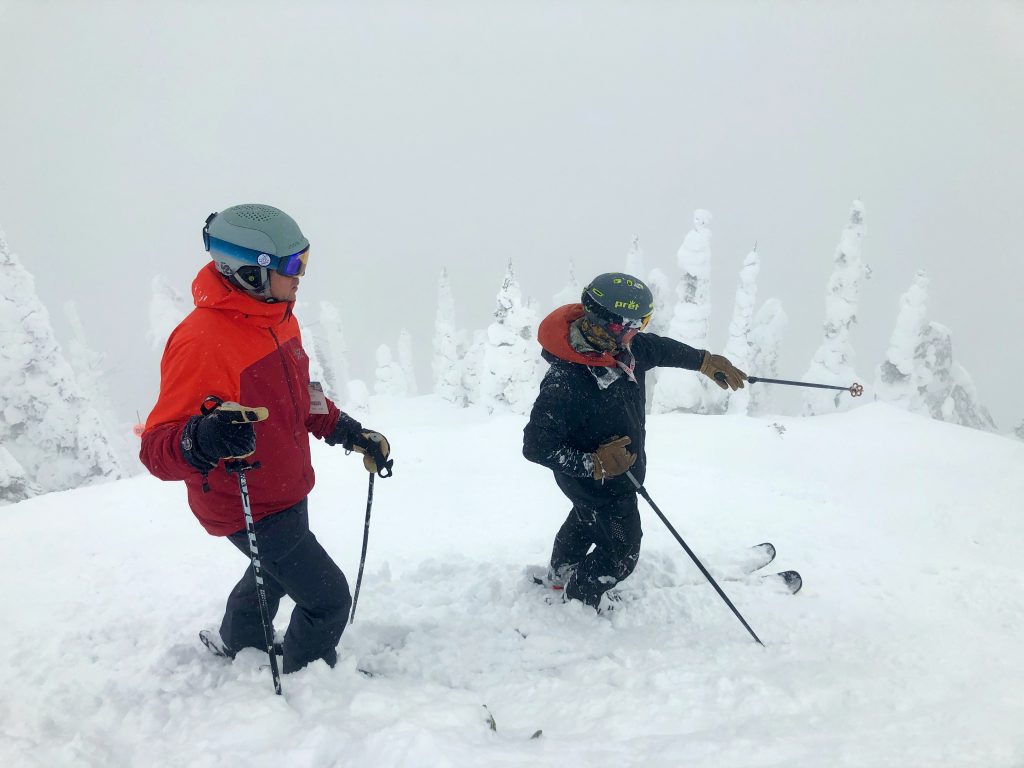
Ryan Friel: I was going to say there hasn’t really been a bad ski turn in the day thus far. And then I thought Mike might say there has been one. [Laughter. On the last run, Mike had a big wipeout.] Mike may say, “I remember one bad turn for me,” but that wasn’t really the snow’s fault.
Mike Powers: That was operator error, all my fault.
Drew Bledsoe: I went cat skiing at Mount Bailey a bunch of years ago. I took a really nice digger off of one wind drift into the face of another huge drift. Broken ski pole, full face plant, you’d have been proud. So, I ski back over to the group and one guy said, “Are you okay, man? That looked like it hurt.” “Yea I’m fine. Compared to what I used to do, this stuff doesn’t hurt.” And the guy looks at me and says, “What the hell did you used to do?”
Ryan Friel: I had 300-pound lineman trying to kill me on a very regular basis.
Drew Bledsoe: I had really strong, mad dudes trying to break me in half.
Brian Schott: So you just went through the 20-year anniversary of your injury. Can you talk a little bit more about that?
Drew Bledsoe: Yeah. The injury itself. I didn’t know how serious it was until I woke up in the hospital a few hours later. And the aftermath, I didn’t really get a sense of how serious it was for even a few days after that. It was kind of a crazy one.
Brian Schott: What was looking back 20 years like?
Drew Bledsoe: The honest truth, the honest, honest truth is I don’t ever think about it, and I wouldn’t change it. I don’t have a lot of negative feelings toward any of it. Whether how it all happened was right or wrong, it doesn’t matter anymore. I don’t dwell on it. Shit happens in life, then you die, or you move on.
How it changed my career and got Tommy [Tom Brady] on the field and let him go and all of that stuff? I mean I can’t change that, so why lament it? And I got to spend time in Buffalo, which most people would think would suck, but we actually really loved Buffalo. And I got to play quarterback for the Cowboys for a minute which was really cool. And I still have a great relationship with the fans and ownership in New England. You know, it’s all these things that you can’t change in your life. You just try to go forward and do your best with whatever hand you are dealt. I’m glad I lived. That would have sucked.
Ryan Friel: We are too. Otherwise, we wouldn’t be able to talk like this and ski powder with you.
Drew Bledsoe: That would have sucked to die and miss out on 20 years of powder skiing.
Ryan Friel: It is a good thing I’ve learned—it’s not always what happens to your life, it’s what you do with it.
Mike Powers: How you react to that difficulty in your journey.
Drew Bledsoe: Absolutely. We all have choices, no matter what hits us. Unless it puts you in the grave, you have choices on how you react to things. There are times when you may not have a great option, but you always have options. Pick the best option and do the best you can.
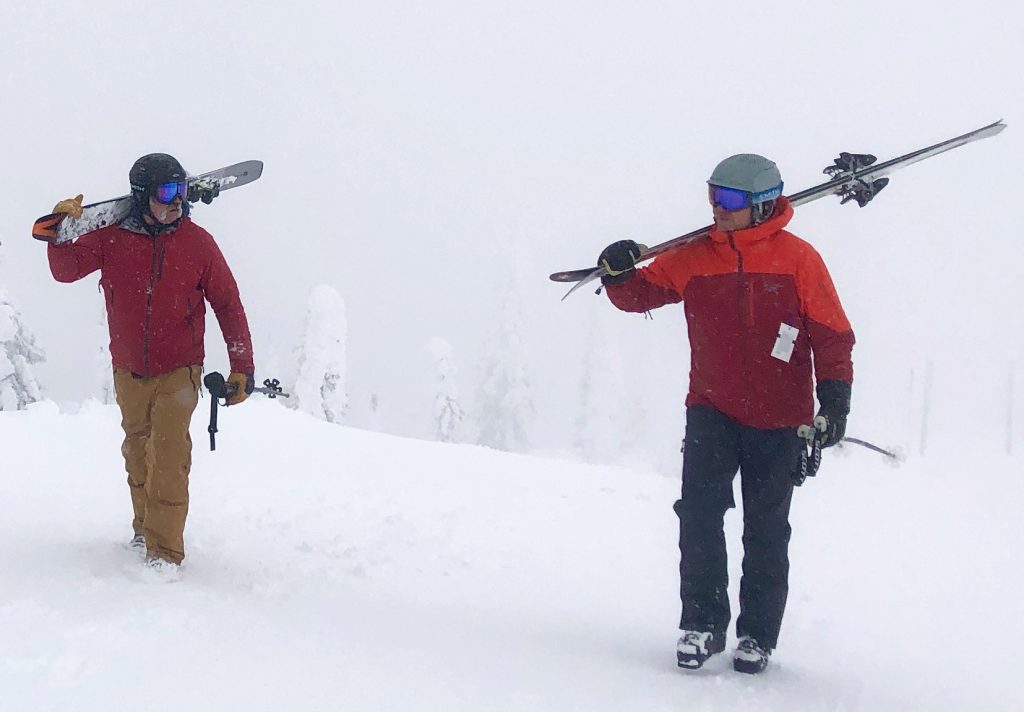
(photo credit: Brian Schott)
Illumination from the Mountains of Montana
If you enjoyed this, please support this independent literary journal.
Help sustain the Whitefish Review as a monthly donor, annual donor, or one-time donor. Whitefish Review is a 501(c)(3) non-profit so your gift is 100 % tax-deductible.
Subscribe to the print journal, order a single copy, or buy a T-shirt.
You can also find us on Facebook, Instagram, and Twitter.
Thank you for supporting the arts!

